Wipe the oil from my neck with the cotton and then put it away for the boy, she said.
He blotted the oil on her neck but it continued to seep thickly. Soon the entire roll of cotton was heavy with oil.
I’ll bring a towel, he said.
No need. But you must remember that this oil is for the boy. Rubbing him with this oil will protect him from sickness.
She saw his shadow figure in the gloom of the Jaffa house. Her mother-in-law had put her foot down; their residence in the family home was to be permanent. It’s his father’s home, she said. No one abandons his father’s home. She told Milia that Amin’s widow, Asma, would remain in Amin’s room with her children, who would be moved from Mansour’s room to their own father’s room. Milia and her husband and daughter would live in Mansour’s room. There was absolutely no need to build an additional room onto the house.
God’s will be done, Milia responded, and then looked her mother-in-law in the eye. A boy, Aunt, it is a boy in my womb, not a girl.
Even before her pregnancy, Milia was certain that her child would be a boy. For his sake she had endured this long voyage of hers. She tried her best to get Mansour to understand that her love for him was her love for the child inside. She tried to make him see that ultimately a woman lives a single love story in her life. Hers was her love for her child, she wanted him to know, because the secret and unfathomable bond that comes into being between a woman and her womb resembles no other tie.
But she sees him, standing in the shadow in the darkened passageway linking the dining room to the kitchen in the Jaffa house. He stands there, still, and Asma is pressed close to him as if he is embracing her. The short dark full figure hangs on to Mansour’s neck as if she were scaling his body and Mansour bends down to meet her, burying his face in her neck. She walks toward them. She coughs to let them know she is here and that Mansour must stop. But he does not hear. She is right behind him now and she can see Asma’s small open eyes turned upward as if they are traveling to a faraway place. She sees herself float between them as though she were a ghost who could pass through doors and bodies. She turns and gazes toward her life and she dwindles away again, now, just as she did in the dream of Najib when she saw him holding the other woman and understood that this man would leave her.
This was shameful, she told the two of them. The fellow has been dead only a month, aren’t you ashamed of yourselves?
They did not hear her or see her, as though they were immersed in a sea of pleasures and secrets. She circled around and stood directly behind Mansour. She put her hands on his shoulders and shook him. Then, in the distance emerged three boys, two as alike as a pair of facing mirrors and the third darker with curly hair and greenish eyes. The three came up to the man embracing the woman and the pair disappeared among the four intertwined legs. Milia ran toward the dark child, who lay sprawled on the floor, blood trickling from his eyes. Ya waylak min Allah, she shrieked at Mansour. Don’t you see the boy? She leaned down to pick up her son, to flee with him, and then everything went black. She saw herself floating on gelatinous waters while the small child thrashed and panted as though he could not breathe. A tiny fish, its lead-gray skin made to glisten by water and salt, gasps as though it cannot get air it needs. It opens and shuts its eyes as if beseeching help. Milia cups the fish in her hands and swims amidst towering waves. Holding the fish while standing on the rocky shore trying to cover her tiny breasts with her small hands, she sees Mansour swimming. She shouts at her little brother to come. Don’t abandon him, brother! This is my son whom I have named Issa, and I am alone, brother. Hurry, hurry before the boy’s lungs fill up! Musa has disappeared and the fish swims to Milia, still standing at the water’s edge. The fish’s skin turns reddish threaded by streaks of white. It rises to the surface and floats on the surface of the water.
Mansour advanced toward them. He took hold of the dead fish and threw it out into the sea. He turned toward Milia and ordered her to come home with him to Jaffa.
But our home is in Nazareth.
Our home is in Jaffa now. Pick up your belongings and follow me. Milia opened her eyes at the sound of the short nurse’s voice. The nurse stood facing her and Milia heard the other nurse’s voice behind her, saying that this birth was a difficult one and the doctor must do something.
Step back, said the doctor, and she heard a deep hoarse voice. Do not fear, my daughter, for I am here with you.
The nun appeared. Haajja Milana was old and blind now, and her black gown could not contain her body. In front of her knelt a woman of pure white in a long white robe, her white-blond hair a candle-lit halo. As the woman wept, the nun patted her head, and from her eyes sprinkled pearl drops like the tiny pearls strewn across the stone courtyard at the Church of Our Lady of the Tremblings.
Little Milia appears and stands behind the kneeling woman. She bends over the pearls and tries to pick them up but the pure white beads roll out of her tiny hands.
The nun’s voice is rough. Milia, my dear, where is the baby? You should be in the hospital. What are you doing here, girl?
I am in the hospital and you can see how much pain I am in — but what are you doing here and who is this woman kneeling on the floor?
This is the sinning woman who knelt and washed the feet of the Messiah in perfumed water. She is waiting for you, and for your son, too.
She is waiting for me?
The blond woman stands up and approaches Grandfather Salim and takes him into her arms. The nun disappears slowly as if her image is dissolving in the water. The grandfather whom Milia never saw in her life slips out from the arms of his lover and comes to the little girl and takes her in his arms.
Sister Milana is standing erect, and she stretches out her arms as if seeking the guidance of the open air. The white-blond woman draws a black shroud over her body as she steps toward Milia and begins to slap her. She clutches the little girl’s short kinky hair — and the hair grows long. Locks of hair fly and scatter across the ground. The girl is certain that the woman means to pull her entire head of hair out with her two bare hands.
Please, Haajja, I don’t want to die –
The nun stands impassively watching as little Milia begins to roll across the ground. She hears a raucous laugh issuing from the nun’s throat and she screams. Mama, please!
Open your eyes, said the doctor.
Milia opened her eyes to see Tanyous holding her hand, leading her to the wellspring.
Here is the Virgin’s Wellspring, he said. Here, drink.
Milia leaned down and drank. She drank deeply but the water did not stem her thirst. She lifted her head from her hands cupped around the water which ran through her fingers and said that she was still thirsty.
Drink, drink as much as you want, but you will still be thirsty. Maryam came here after they crucified her son. She stood where you are standing and wept. From her tears the spring welled up. She bent over it and drank from her tears but her thirst was not quenched. No one can quench their thirst with tears.
The short nurse said the woman was crying so hard that her tears covered her face.
She told Tanyous she was not crying. Why would I cry, when I am thirsty and I am drinking. But where does this thirst come from, Father?
It is the thirst of love. Love makes one thirsty. A woman is always thirsty because she can never satisfy her thirst in front of her son. At the cross Maryam the Virgin discovered thirst and for the rest of her life, no matter how much water she drank, her thirst remained. Her thirst was endless because she felt remorse.
Читать дальше












